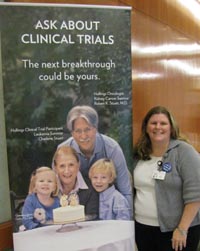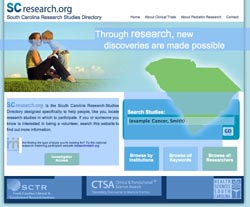|
Seeing pictures of herself
plastered on the backs of buses or on life-sized posters in the lobby
at Hollings Cancer Center takes some getting used to.
 Ann Ramsdell recalls coming into
the Hollings Cancer Center (HCC) lobby with her son, Griffin, who got
excited when he saw the poster. "He asked, 'Mommy, when we took that
picture, did it help you feel better? Did it help you not be so sick?'" Ann Ramsdell recalls coming into
the Hollings Cancer Center (HCC) lobby with her son, Griffin, who got
excited when he saw the poster. "He asked, 'Mommy, when we took that
picture, did it help you feel better? Did it help you not be so sick?'"
She told him yes, in more
ways than he could know.
If the images lead to just
one person enrolling in a clinical trial, it's worth it to researcher
Ramsdell, Ph.D. The developmental biology scientist and associate
professor who works at HCC is one of many patients who are allowing
their stories and pictures to be used as part of a campaign to raise
awareness of the importance of clinical trials.
Ramsdell, who was diagnosed in June 2009 with stage 3 breast cancer,
said her diagnosis shocked her. She was training for a marathon, ate
well and had no history of breast cancer. "I did everything right. I
was not a person who was supposed to get cancer."
Yet, the diagnosis. Life
goes like that sometimes.
Ramsdell absorbed the
shock, her mind racing to her two boys, ages 3 and 5 at the time. "The
very first thing I said was 'Oh, my God, my children—my boys,' and then
the second thing I thought was how do I do cancer without needles? I
hate needles."
Researching clinical
trials before she even met with her doctor, she knew she would be
enrolling in one because they offer access to the latest treatments and
medications.
"I wanted whatever would
be the most aggressive form of treatment. Secondly, as a scientist, I
think there is great value in participating in clinical trials, not
only for oneself but for future generations of patients. I truly
believe that. Being scientists, we run experiments every day. Here was
an opportunity to do so on a whole different level. It was an
opportunity to give back."
Many patients fail to
realize that all participants in a clinical trial receive the highest
standard of care that would be delivered to any patient. The only
difference is that they may also be getting another layer of care, such
as a drug or technique, she said.
She enrolled in a trial
and proceeded with her treatment, which included chemotherapy, surgery,
radiation, physical therapy and medication. One part of her treatment
at HCC that she found beneficial was working with a neurobehavioral
oncologist.
"Having someone capable of
talking to me about these life issues is huge. I'm a scientist. I can
push him on the numbers. We can have some very direct conversations.
Some patients don't want to know, but I do."
Getting through treatment
was one of the hardest things she's had to do, but everyone from a
volunteer with the snack cart to members of her oncology team kept her
from staying stuck in what can become a dark, depressing time, she
said. "I have a dream team. There's a lot of compassion here. There
were days when I could barely get myself here, but there was the power
of a smile or someone calling me by my name or asking about my
children."
During treatment, she
unexpectedly found a new calling.
Having five-hour days to
spend in an infusion suite gave her time to research breast cancer. For
the past 15 years, her research has focused on embryonic heart
development and congenital heart defects, but what she found in her
reading was that many genes involved in heart development also are
associated with breast cancer.
Her excitement grew as she
started making more connections, developing a research plan that
received grant funding from the National Institutes of Health this
month. It's engaging to switch gears, she said. "When you bring people
into a field that's new, it can bring fresh insights."
Her collaborative project
with Demetri Spyropoulos, Ph.D., will investigate whether these genes
are deregulated during mammary gland formation and if so, whether this
elevates the risk for developing breast cancer later in life. In
collaboration with Joan E. Cunningham, Ph.D., the work will extend into
population-based studies of breast cancer patients.
Ramsdell said she had no
idea how long and extensive her recovery would be. She's finally back
to going for her runs and working out with a personal trainer. She's
grateful for the insights she's gained through her battle with cancer
and the way her life has changed for the better. She's done a
reassessment of her life on all levels of what's important to her,
including her research, she said.
"I'm happier now. I'm more
conscious of what stays and what goes—what's really important. If my
children want to linger five minutes more over pancakes, then we do."
She's glad her experience
can be a part of HCC's campaign to raise awareness on the importance of
clinical trials. "It takes education. If people really understood that
the benefits are really high—the potential is really there for a better
form of treatment, then people would have more incentive to
participate."
Ramsdell said it never
occurred to her to not be in a clinical trial.
"It's a matter of
preserving my life. As a mother with young children, I have that
responsibility to go after the most aggressive treatment possible. I'm
not private about my diagnosis or my treatment experience. Part of that
is that I want people to understand about clinical trials. I hope I'm
helping others."
Top Three Tips
The top three tips
Ramsdell wishes people knew about clinical trials.
1. Patients are very carefully monitored and get the best standard of
care that any patient would. Being on a clinical trial would not
prevent that.
2. Get enrolled in a trial early. "If I had started elsewhere instead
of Hollings Cancer Center and gotten referred, the prior treatment may
have made me ineligible for a trial."
3. Don't be afraid to ask questions and research what clinical trials
may be available. Be active in your health care. "Ultimately the
decision-making power lies with the patient. We live in a different era
now. All the resources are there to take charge and participate in your
care."
By
Dawn
Brazell
Public Relations
Patients come and go, but there are those who leave that indelible
imprint. One of those for Robert K. Stuart, M.D., was his first cancer
patient—a teenager with advanced Hodgkin lymphoma. He met him on the
first day of his oncology fellowship in 1976. Stuart's faculty
supervisor thought the case hopeless.
Stuart, too young to know
better, thought otherwise, and opted to treat him on a clinical trial.
 Terri Matson stands beside a HCC
campaign poster featuring Dr. Robert K. Stuart and his family. Terri Matson stands beside a HCC
campaign poster featuring Dr. Robert K. Stuart and his family.
"Not only did he survive,
he eventually invited me to his wedding," he said. "I had no hesitation
in recommending a clinical trial for my wife when she needed one." The
only reason he didn't volunteer for a clinical trial when he had kidney
cancer was there were none at the time.
Times have changed.
Hollings Cancer Center
(HCC) wants to make sure everyone knows that through a clinical trials
awareness campaign aimed at getting more patients campuswide involved
in clinical trials. HCC is striving for Comprehensive Cancer Center
status with the National Cancer Institute, the highest distinction that
a cancer center can receive with only 40 centers in the nation having
achieved it. One way to achieve it is to have at least 15 percent of
patients enrolled in a clinical trial. HCC has just passed the 12
percent mark.
The campaign's motto: "The
next breakthrough could be yours." Stuart, HCC medical director of
clinical trials, said the campaign isn't just for HCC, but for all
departments in the hospital.
"Frankly, we need more
physician involvement. We need M.D.s who are not satisfied with the
status quo, who believe in trials as the only way to improve outcomes,
who get involved enough to find the best trials, and who are willing to
recommend—not just offer—trials to their patients."
Greater knowledge of the
human genome has uncovered a huge number of potential "targets" for
cancer therapy. This means the need for clinical trials and
the potential for meaningful improvements in treatment have never been
greater, another reason he feels so passionate about HCC's campaign, he
said.
"Clinical trials are the
only way to advance new ideas and discoveries from the laboratory to
the clinic. I have personally seen lives saved by participation
in clinical trials. Today cancer patients in North America have a
two-thirds chance of surviving their cancer; in the 1970s, it was only
a one-half chance. How do you think that happened?"
Terri Matson, director for research administration at HCC, knows how it
happens.
"We're definitely going in
the right direction," said Matson, who is helping to spearhead the
awareness campaign that is targeted to faculty, staff and patients.
"Discoveries only can come about because of clinical trials."
Common
Misconceptions
Matson hopes the campaign will correct some misconceptions that keep
patients from participating. Some patients fear they won't be getting
the "real" treatment that could save their lives. "This couldn't be
further from the truth, since all patients get the same standard of
care. Being in a clinical trial wouldn't prevent that. What it could do
is shed light on what tomorrow's standard of care will be," she said.
Matson said what many
people fail to realize is that participation in a trial actually gives
them an added layer of security.
"There's another level of
monitoring."
There's an altruistic side
of participating in trials in that some patients feel they might
benefit the next generation. Of course, patients with life-threatening
illnesses hope they have landed a trial that offers clues to a cure or
better treatment, she said. Sometimes that doesn't happen, but it's
part of the process.
 The following websites offer important information about clinical trials: http://scresearch.org/; http://hcc.musc.edu/clinicaltrials; and http://clinicaltrials.gov/ct/gui. The following websites offer important information about clinical trials: http://scresearch.org/; http://hcc.musc.edu/clinicaltrials; and http://clinicaltrials.gov/ct/gui.
At HCC, about 12 percent
of all patients or about 270 a year enroll in trials. At any given
time, there will be more than 1,200 patients involved in various
trials, covering a wide range of objectives.
The campaign features
life-size posters and flyers in lobbies and waiting areas. Though the
patients featured are cancer survivors, the campaign is to raise
awareness in all specialties of the value of clinical trials, she said.
Staff members are wearing buttons and have been trained in how to field
questions.
"This campaign affects
every single faculty and staff member here. We want patients to feel
comfortable asking about clinical trials and physicians to feel
motivated to get their patients enrolled."
More patient enrollment
translates to better research and bodes well for faster development in
the field of personalized medicine, she said. "That's where the future
of health care is going. Patients are going to respond differently
because we have different genetics."
Her advice to patients and
medical professionals is to ask questions and become aware of the
latest ongoing trials in their area of interest. There can be different
types of trials, such as treatment or screening, and different phases
that they can be in.
One tip she has for
newly-diagnosed patients is to seek out an academic medical center for
a second opinion and ask about the availability of clinical trials
before seeking treatment.
"Patients should evaluate
all their options."
Pediatric
Role
Model
An area that has had the most success in getting patients enrolled is
pediatrics. Historically, pediatric cancer clinical trials have been a
model in that nationally 80 percent of eligible children enroll. At
MUSC's Children's Hospital, it's 85 percent, according to Michelle
Hudspeth, M.D., director of pediatric blood and marrow transplantation
and division director of pediatric hematology/oncology.
Offering high-quality
clinical trials is an inherent part of pediatric oncology. The
dramatic improvements during the last 30 years in the cure rates of
childhood cancer are directly linked to clinical trials, she said.
"When faced with a
newly-diagnosed cancer patient, pediatric oncologists instinctively
ask, 'What clinical trials are available for my patient?' We are all
aware of the tremendous legacy of clinical trials in our field and are
eager to hopefully have our generation of patients become part of the
next breakthrough in treatment."
Hudspeth said parents need
to understand the amount of planning and monitoring that is involved.
She typically takes the time to explain to families the level of
intense scientific scrutiny that has happened on a national level in
the development of the cooperative Children's Oncology Group trials.
"I also make sure they
understand that trials have stopping rules and undergo frequent review
by data monitoring and safety boards. For instance, if there is a
clear benefit to a particular treatment or an unacceptable rate of
toxicities occurs, the trial is stopped, and we are immediately
notified. Because childhood cancer is overall rare, significant
advances in treatment can only occur through involvement in cooperative
group trials."
For enrollment in clinical
trials to happen, physicians have to be willing to make the time to do
the education required, she said. In her area, families are
understandably in shock when their child is diagnosed with cancer.
"We have a tremendous
responsibility to make sure patients and families understand what
clinical trials are, how the therapy may differ from standard of care
and that participation is truly their choice. Physicians need to
be able to have the time to spend with families to explain the process
and their options."
She hopes future efforts
for clinical trial enrollment will look at novel ways of educating
patients and families about clinical trials, such as better utilizing
technology to share information and help families make complex
decisions.
Stuart agrees, and hopes patients realize the need to be proactive.
While it's the role of doctor and investigator to evaluate trials and
determine their quality, feasibility and appropriateness for the
patient population, it may be the patient who is most motivated to
start the discussion, he said.
"We encourage patients to
educate themselves about clinical trials, ask whether they are eligible
for a trial and seek a recommendation from their physician. I have
concluded that the best way to motivate physicians to become involved
in trials is for their patients to ask about them. That's why we
are doing this awareness campaign."
|



 Ann Ramsdell recalls coming into
the Hollings Cancer Center (HCC) lobby with her son, Griffin, who got
excited when he saw the poster. "He asked, 'Mommy, when we took that
picture, did it help you feel better? Did it help you not be so sick?'"
Ann Ramsdell recalls coming into
the Hollings Cancer Center (HCC) lobby with her son, Griffin, who got
excited when he saw the poster. "He asked, 'Mommy, when we took that
picture, did it help you feel better? Did it help you not be so sick?'" Terri Matson stands beside a HCC
campaign poster featuring Dr. Robert K. Stuart and his family.
Terri Matson stands beside a HCC
campaign poster featuring Dr. Robert K. Stuart and his family.